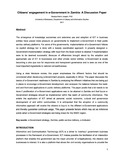| dc.description.abstract | The emergence of knowledge economies and extensive use and adoption of ICT in business
entities have placed more pressure on governments to implement e-Government in their public service delivery platforms. For some of the governments, implementation of e-Government follows
no explicit strategy but is done with a loosely coordinated approach. A properly designed e-Government
implementation strategy with input from the local context is desired if implementation
were to be deemed successful. Because of efficiencies brought about by the adoption and
appropriate use of ICT in businesses and other private sector entities, e-Government is slowly
becoming a sine qua non for responsive and transparent governance and is seen as one of the
most important ingredients to national competitiveness.
Using a desk literature review, this paper emphasises the different factors that should be
considered when developing e-Government projects, especially in Africa. The paper discusses the
basics of e-Government readiness in Zambia by analysing the different initiatives that are being put
in place to encourage e-Government development, and analyses the balance between the back-end and front-end applications in public delivery platforms. The paper posits that a lot needs to be
done if proliferation of e-Government applications was to be attained in Zambia and that future Zambia and that future e-Government
strategies should be implemented within the realm of community informatics. This
entails the application of ICT aimed at personal, social, economic, cultural and governance
development of and within communities. It is anticipated that the adoption of a community
informatics approach will enable the citizens to buy-in to the different e-Government applications
and thereby guarantee continued usage. This paper presents factors which may act as reference points when e-Government strategies are being drawn for the SADC region. | en_US |

